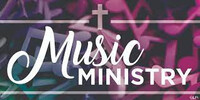A consistent element of religion and worship among ancient people has been the use of music and dance. Human beings have used music to express emotions throughout history and this has carried over to their beliefs and the manner in which they have been celebrated. Times of sorrow and joy, victory and defeat, times of need and gratitude have found in music the means of identifying and capturing the moment. Music has also enabled men and women to communicate with God (the gods) and petition, thank, glory and even placate the divine.
This is also true in our Judaic-Christian tradition. The ancient Hebrews certainly made use of music in their relationship with the God of Abraham, Isaac and Jacob. As God continued to reveal Himself more and more to his chosen people, they no doubt celebrated this with music. We see the first real, tangible example of this in the Book of Exodus when after they have fled Egypt and have journeyed through the Reed (Red) Sea the Egyptian forces are destroyed in the receding waters. Exodus recounts that Miriam (the sister of Moses) leads the people in a joyous song with tambourine in hand.
At Mt. Sinai Moses is given instructions in the setting up of the tabernacle (mobile temple) which would be the sign of the presence of God in their midst. This presence, together with sacrifice, was most certainly also celebrated though the use of music. This would continue to develop until the Ark of the Covenant was brought into Jerusalem by King David. This event is found in the Second Book of Samuel and records that David danced before the Ark to the sound of the horn as it was brought into Jerusalem. It is this same King David that is traditionally identified as the composer of the Book of Psalms. Scholars generally attribute 73 of the psalms to David with others being composed both before and after the Babylonian Exile. Truth is, it is impossible to definitively identify the time of composition. What is known with certainty is that these psalms (the lyrics of the songs) were extensively used in both the synagogue and temple.
The psalms were, in a true sense, the hymnal of the Jewish people and as such became the hymnal of the Church. This would be the case for the early Church in Jerusalem and also for the Church after the destruction of Jerusalem as it spread throughout the Mediterranean. We find other examples of early church music in the Letters of St. Paul. Paul inserts into his letters various familiar hymns the best example being that found in his letter to the Philippians in the 2nd chapter.
Today the church makes use of a wide variety of music. We hear Gregorian Chant, polyphonic music (multi voices), chamber music, contemporary music and even symphonic music. The important thing to remember that if these various forms are done well, then they give thanksgiving, glory and praise to God.
Needless to say, the Music Ministry has an essential role to play in the worship and praise that the Church offers to God. The ministry, done well, serves not only God, but the people of God, the church. There are many ways to participate musically. Whether you play an instrument or would like to participate in the choir or as a cantor, your talent can provide a testament to the Glory of God. If you are interested in joining this ministry, or if you want more information regarding this ministry, please fill out the form below and we will reach out to you with more information.

